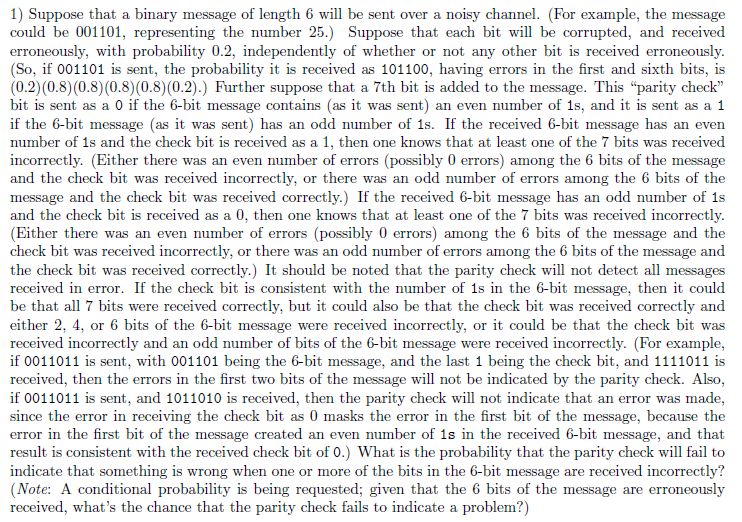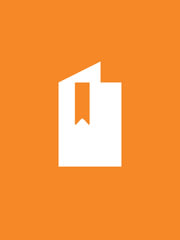1) Suppose that a binary message of length 6 will be sent over a noisy channel. {For example, the message could be 001101, representing the number 25.) Suppose that each bit will be corrupted, and received erroneously, with probability 0.2, independently of whether or not any other bit is received erroneJusly. (So, if 001101 is sent, the probability it is received as 101100, having errors in the rst and sixth bits, is (0.2)(03) [0.8}(0.8){0.8)(D.2).} Further suppose that a 7th bit is added to the message. This \"parity check\" bit is sent as a 0 if the 6bit message contains (as it was sent) an even number of 1s, and it is sent as a 1 if the 6bit message (as it was sent) has an odd number of is. If the received 5bit message has an even number of is and the check bit is received as a 1, then one knows that at least one of the 7 bits was received incorrectly. [Either there was an even number of errors [possibly 0 errors} among the 6 bits of the message and the check bit was received incorrectly, or there was an odd number of errors among the 6 bits of the message and the check bit was received correctly.) If the received 6bit message has an odd number of 1s and the check bit is received as a D, then one knows that at least one of the 7 bits was received incorrectly. (Either there was an even number of errors [possibly 0 errors) among the 3 bits of the message and the check bit was received incorrectly, or there was an odd number of errors among the 3 bits of the message and the check bit was received correctly.) It should be noted that the parity check will not detect all messages received in error. If the check bit is consistent with the number of is in the 6bit message, then it could be that all 7 bits were received correctly, but it could also be that the check bit was received correctly and either '2, 4, or 5 bits of the 6bit message were received incorrectly, or it could be that the check bit was received incorrectly and an odd number of bits of the 6-bit message were received incorrectly. (For example, if 0011011 is sent, with 001101 being the 6bit message, and the last 1 being the check bit, and 1111011 is received, then the errors in the rst two bits of the message will not be indicated by the parity check. Also, if 0011011 is sent, and 1011010 is received, then the parity check will not indicate that an error was made, since the error in receiving the check bit as 0 masks the error in the rst bit of the message, because the error in the rst bit of the message created an even number of 13 in the received 6bit message, and that result is consistent with the received check bit of 0.} What is the probability that the parity check will fail to indicate that something is wrong when one or more of the bits in the 6bit message are received incorrectly? (Note: A conditional probability is being requested; given that the 5 bits of the message are erroneously received, what's the chance that the parity check fails to indicate a problem?)







